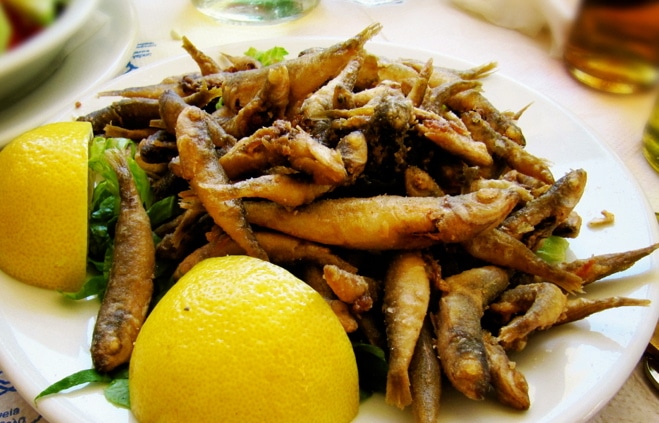The Mediterranean diet goes mainstream, but it wasn’t always that way, it was once thought to be harmful.
 Today is the last day of National Mediterranean Diet month and I wanted to talk about how far the Mediterranean diet has come. When I think about the diet, I realized that 30-40 years ago, not many non-Mediterraneans knew about this diet, now known as the gold standard of diets.
Today is the last day of National Mediterranean Diet month and I wanted to talk about how far the Mediterranean diet has come. When I think about the diet, I realized that 30-40 years ago, not many non-Mediterraneans knew about this diet, now known as the gold standard of diets.
Today the Mediterranean diet has gone mainstream and I’m not talking about gyros or pizza. I remember when bread started appearing with little plates of olive oil instead of butter, “Greek” salads and spanakopita were on the menu in non-Greek restaurants and thinking that this wonderfully healthy and tasty diet I grew up on, was finally gaining the acknowledgement it deserved.
But it wasn’t always that way; in the 60’s when my parents (read here for my mom’s experience) first came to the U.S. to live in Chicago, they could only find Greek products in Greek town. It was only in the 70’s that large super markets started carrying tiny bottles of Spanish and Italian olive oils. But you still had to go to Greek town or Italian grocery stores to find basic ingredients used in Greek cuisine such as feta cheese, oregano, lamb, sardines, whole fish (not the frozen fillets), phyllo dough, romaine lettuce, seedless cucumbers, dill and eggplant.
And while my parents and many other Greeks continued to cook and eat Greek, it wasn’t always easy. Others looked down at this type of cuisine rich in olive oil, garlic, and onions.
Americanization and the dangerous Mediterranean diet
Years ago… social workers were visiting immigrants living in the US in an effort to “Americanize” them. “Americanization” was a phrase that referred to teaching immigrants American values as quickly as possible so that they could blend in the cultural melting pot. Many social workers and teachers who were responsible at the time believed that food was the best place to begin. As historian Harvey Levenstein notes: “These Americanizers were convinced that the immigrants could never be weaned from their old-country attitudes until they abandoned their old-country ways of living and eating. The acrid smells of garlic and onions wafting through the immigrant quarters seemed to provide unpleasant evidence that their inhabitants found American ways unappealing; that they continued to find foreign (and dangerous) ideas as palatable as their foreign food.” Many Americans believed that garlic was harmful and that olive oil was too strong and was recommended to be replaced with corn oil.
Little did they know that years later scientists, the media and foodies would be praising this type of eating as the healthiest in the world.
Mediterranean Diet Experts?
As with everything that becomes popular, Mediterranean diet experts popped up everywhere and out of no where. Can one become an expert on this way of eating just by visiting the Greek islands or Italy one summer or because they “discovered” olive oil and sun dried tomatoes or by reading about it as if it’s just another diet? I think not. But that is the reality and that is why we are seeing books with titles such as Low Fat Mediterranean Diet, 28 Days Mediterranean Diet, Become Sexier with the Mediterranean Diet, Paleo Mediterranean Diet and the list goes on and on. Some of these books are downright scientifically incorrect and others just miss the point. It’s not about adding a bit of olive oil to your salad or eating feta cheese or mozzarella once in a while. Nor is it about making a Mediterranean inspired recipe once a week. It is a way of eating, an attitude, a philosophy and most of all it is a pleasure. Yes it may sound cliché but it is true.
Eat Simply-Eat Mediterranean
The Mediterranean diet is actually a quite simple way of eating, I don’t understand why everything got so complicated. Really, it is a diet based on what the land produced; simple fresh and seasonal food, plenty of fruits and vegetables, little meat and olive oil. It really is that simple, and anybody can eat this way. No you don’t need to learn complicated recipes, nor do you have to spend hours in the kitchen using exotic ingredients.
From the perspective of a dietitian and nutritionist and more importantly a Greek who was raised eating the Mediterranean way, I have to say it is quite simple: eat vegetables everyday by sautéing them with a bit of olive oil and cooking them with tomatoes and herbs, eat red meat once a week (or less), eat beans twice a week, eat fish twice a week and avoid processed foods. Pretty simple right? And if you do have some time and want to try a few simple and easy Mediterranean-Greek inspired recipes and learn more about about the Mediterranean diet from a “real” Mediterranean, stay tuned here at Olive Tomato

I look forward to seeing them!
Thank you Brenda! I am glad my recipes are providing ideas for this population. I will be adding some low sodium Greek recipes as well.
Elena,
Many thanks for your wonderful blog. I am a Registered Dietitian in Clinical(Hospital) practice and love your recipes and articles. We instruct many of our Cardiac and Diabetic patients in the Mediterranean Diet. I will be using some of your recipe ideas for the Stroke Club. Keep it up!